WMG News
Partnering with Rolls-Royce and Electroflight to create the battery for world’s fastest all-electric aircraft
- The Rolls-Royce ‘Spirit of Innovation’ aircraft is officially the world’s fastest all-electric aircraft, clocking up speeds of 387.4mph
- Rolls-Royce worked in partnership with aviation energy storage specialist Electroflight to create this world-class technical achievement for the UK, that will help lead the way towards a more sustainable way to fly
- In order to power the aircraft, the most power dense propulsion battery pack ever assembled in aerospace had to be developed directly supported by researchers from WMG, University of Warwick using their state-of-the-art battery characterisation and testing facilities
In the wake of COP26 the need for electrification has never been more evident, with aviation top of the list of global priorities.
Committed to taking on this challenge, Rolls-Royce decided to create the ‘Spirit of Innovation’, an all-electric aircraft, which this week officially set not one,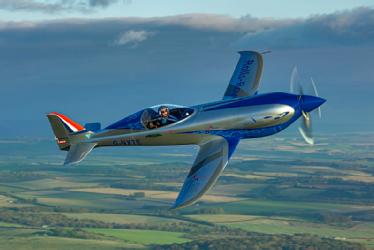 but two World Records and during these record runs it reached speeds of 387.4mph (623 km/h) making it the world’s fastest all-electric vehicle.
but two World Records and during these record runs it reached speeds of 387.4mph (623 km/h) making it the world’s fastest all-electric vehicle.
In embarking on this unprecedented feat, Rolls-Royce partnered with aviation energy storage specialist Electroflight to help develop the battery system for the record-breaking plane. The WMG team at the University of Warwick were exclusively used to test and validate the batteries used on the aircraft.
Using their state-of-the-art facilities at WMG’s Energy Innovation Centre, researchers at WMG supported the team through the development process, conducting extensive electrical, thermal, safety, and vibration & shock testing. This was delivered all the way from Electroflight’s initial single lithium-ion cell selection through to the battery module and finally the battery pack for a full propulsion battery system.
Testing included cell selection, fire protection system design, module level thermal management, system testing and pack level testing, and also included sub-powertrain testing of the battery system and electric machines connected together.
Individual components such as the battery casing materials, individual lithium-ion cells, cell clusters and sub-modules were all examined in WMG’s battery testing laboratories including the Battery Abuse Testing Centre. Aerospace DO-160G shock and vibration testing was performed in WMG’s battery vibration facility – the first time an aircraft propulsion battery has successfully completed DO-160G testing in the UK.
On 16th November, the Spirit of Innovation took to the sky at the UK Ministry of Defence’s Boscombe Down experimental aircraft testing site for its record-breaking flight. Data was submitted to the Fédération Aéronautique Internationale (FAI), who control and certify world aeronautical records, have confirmed that the Spirit of Innovation is the world’s fastest electric plane.
The two new world records broken are:
1. The aircraft reached a top speed of 555.9 km/h (345.4 mph) over 3 kilometres, smashing the existing record by 213.04 km/h (132mph)
2. The aircraft achieved 532.1km/h (330 mph) over 15 kilometres – 292.8km/h (182mph) faster than the previous record
Chief Engineer Mark Amor-Segan, from WMG, University of Warwick comments:
“It’s incredibly exciting to see Rolls-Royce’s ‘Spirit of Innovation’ be awarded two new world records and officially be titled the World’s fastest all-electric aircraft. It has been a tremendous journey to share with Electroflight, to help verify and validate the battery system end-to-end and help create the most power-dense propulsion battery ever for Aerospace.
“We have worked closely with Electroflight and Rolls-Royce throughout this process, cementing new collaborative relationships and helping achieve world-class pioneering technology. To see it progress from literally a single cell into a full-scale battery system and a world-record breaking flight, is tribute to the incredible dedication and capability of the whole team at ACCEL. This project has played a very important part in our work in Aerospace, and we’re excited to continue our research into electrification and the future of sustainable flight.”
Douglas Campbell, Technical Director of Electroflight said:
“This has been a landmark project for our company and our industry – one which opens up a world of possibilities in the electrification of aviation. We’re thrilled to have played such an important part in this success and grateful to our partners at WMG for their support throughout this endeavour.”
Customer Director Matheu Parr from Rolls-Royce added: “The support we received from WMG to develop the battery technology that would power the world’s fastest all-electric aircraft was critical for the team’s record-breaking triumphs. Rolls-Royce has a long-standing relationship with WMG to ensure we are the forefront of technology and we will build on this capability to deliver propulsion and power systems for the advanced air mobility market.”
ENDS
26 JANUARY 2022
NOTES TO EDITORS
High-res images available at:
Pictures and B-Roll video footage can be found here:
https://www.flickr.com/photos/rolls-royceplc/albums/72157705298410174
https://vimeo.com/rollsroyceplc
Credit: Rolls-Royce
FOR FURTHER INFORMATION PLEASE CONTACT:
Alice Scott
Media Relations Manager – Science
University of Warwick
Tel: +44 (0) 7920 531 221
E-mail: alice.j.scott@warwick.ac.uk
WMG welcomes Victoria Prentis MP, Minister of State at the Department for Environment, Food and Rural Affairs (DEFRA)
WMG was pleased to welcome Farming Minister Victoria Prentis yesterday (Thursday 20th January).
The Minister was welcomed by WMG Executive Chair, Margot James, and given a tour of the Innovate UK-funded Natural Light Growing Centre and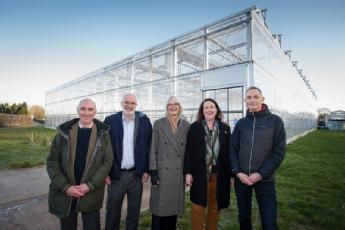 DEFRA-funded vegetable gene bank research centre, run by the School of Life Sciences, at the University of Warwick’s Wellesbourne campus.
DEFRA-funded vegetable gene bank research centre, run by the School of Life Sciences, at the University of Warwick’s Wellesbourne campus.
The delegation then headed to WMG, on the University of Warwick campus, where they were given a presentation from Professor Robert Harrison on horticultural robotics and how they can support on a range of agricultural tasks. They then met with Professor Kerry Kirwan, who explained more about water treatment using recycled carbon fibre sheets.
Finally Dr Mark Swift, Head of SME Programmes, explained more about the SME support programme where WMG has helped the food and drink sector apply digital manufacturing techniques.
Margot James, executive Chair at WMG, University of Warwick said: "It was a pleasure to have Minister Victoria Prentis to visit us today, we were delighted to share the cutting edge research we are doing in collaboration with the agriculture and horticulture industries.
“These are vital sectors to the UK economy but there is vast potential to improve using automation, AI and digital manufacturing, as well as new growing practices being researched by our Life Sciences department."
Farming Minister Victoria Prentis, added: “It was great to visit the University of Warwick, which is making significant strides to ensure agri-robotics can be a reality for farmers and growers in the UK.
reality for farmers and growers in the UK.
“We know how important it is for the industry to maximise productivity and yields. We are putting in place a series of initiatives – from the Farming Investment Fund, to the Farming Innovation Programme – to support the development and uptake of technology which can boost food production, productivity and the environment.”
WMG alumna nominated for prestigious award
 Noor Abu-Jbara, WMG MSc Innovation and Entrepreneurship alumna, has been selected as a finalist for a prestigious Study UK Alumni Award in her native Jordan.
Noor Abu-Jbara, WMG MSc Innovation and Entrepreneurship alumna, has been selected as a finalist for a prestigious Study UK Alumni Award in her native Jordan.
Noor, who graduated from WMG in 2019, has been nominated for a Business and Innovation Award.
The UK Alumni Awards are led by the British Council to celebrate the outstanding achievements of the UK’s international alumni. Award winners and finalists are leaders in their fields who have used their experience of studying at a UK university to make a positive contribution to their communities, professions and countries.
The Business and Innovation Award category specifically recognises those who are active in initiating and contributing to innovative or creative new ideas, solutions or business opportunities, that have the potential for growth.
Professor Jay Bal, MSc Innovation and Entrepreneurship course lead at WMG said: “Noor is passionate about Women’s Entrepreneurship as a tool for empowering women in developing countries. We hope her efforts get recognised at the awards.”
After graduating Noor became the Entrepreneurship and Innovation Supervisor at TheTank by Umniah and the Founder of SHEE. She is trainer and mentor for start-ups and has worked as a consultant and researcher in the fields of innovation, entrepreneurship, women empowerment and management consultation.
The winners will be announced at an awards ceremony on 30th January.
You can read more about Noor’s career here: https://warwick.ac.uk/fac/sci/wmg/education/wmgmasters/alumni-profiles/noor-abu-jbara_iae/
WMG research featured in House of Lords report
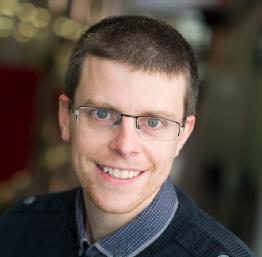 Research led by Dr Mark Elliott, Associate Professor at the Institute of Digital Healthcare at WMG, has been featured in the House of Lords National Plan for Sport and Recreation Report.
Research led by Dr Mark Elliott, Associate Professor at the Institute of Digital Healthcare at WMG, has been featured in the House of Lords National Plan for Sport and Recreation Report.
The report considers the effectiveness of current sport and recreation policies and initiatives, and the case for a national plan for sport and recreation.
Dr Elliott’s research has investigated the effectiveness of the use of incentives and rewards for exercise, using a rewards-for-exercise app called Sweatcoin. The contribution to the House of Lords report was based on the findings that people increased their daily step count by an average of nearly 20% when using the incentives platform.
Dr Mark Elliott, comments: “Our findings highlighted how digital platforms that incentivise physical activity through tracking step count recorded on smartphones can have a positive impact on people’s exercise behaviours. We were pleased to be able to contribute our findings as evidence to the House of Lords National Plan for Sport and Recreation Report.”
Read the report in full here: https://publications.parliament.uk/pa/ld5802/ldselect/ldsportrec/113/113.pdf
New Loqski glass fibre ski lock to keep your skis safe this season
- With winter being the ski season many skiers will be off on holiday, possibly taking their own expensive skis
- When leaving your skis for a break from the slopes they’re at risk of being taken intentionally or unintentionally from the racks, however Loqski have come up with a solution made and manufactured in the UK
- Loqski is a pocketable device locking skis and poles together, WMG at the University of Warwick have helped them manufacture the locks affordably and sustainably
- Loqski’s new and improved lock is available to buy now
 On a ski resort, after spending time on the slopes skiers will often head inside for a break in a restaurant or bar leaving their skis with everyone else’s on a rack outside. For this reason avid skier James Pittard decided not to buy himself expensive skis for fear that they would go missing, whether intentionally or unintentionally.
On a ski resort, after spending time on the slopes skiers will often head inside for a break in a restaurant or bar leaving their skis with everyone else’s on a rack outside. For this reason avid skier James Pittard decided not to buy himself expensive skis for fear that they would go missing, whether intentionally or unintentionally.
This led him to think about an easy to use, pocketable device that could lock both skis and poles simply together. Taking his idea to a design agency, the Loqski ski lock, with its high security combination lock that can be operated even with ski gloves on, was launched in a zinc-based material.
However, as sales were taking off the zinc-based material used couldn’t be manufactured quick enough to keep up with demand, until they discovered GV-5H, a glass fibre reinforced thermoplastic material that is often used in the automotive industry as it’s incredibly tough yet lightweight.
James then approached WMG, at the University of Warwick for help on a number of aspects of this looking into Grivory GV-5H, including testing the material, assessing the strength of the redesigned components in the assembly and giving advice on ways in which costs can be reduced during the manufacturing process.
Whilst it’s not possible to 3D print in Grivory GV-5H, researchers from WMG printed the prototype parts in strong engineering plastic with a carbon fibre infill using Markforged Mark 2 FDM printer that would reflect the strength of this material. These prints proved the suitability of Grivory GV-5H for this product.
They also assessed whether a redesigned barrel design component would fit into the assembly as changing just this one part would help reduce costs. They produced many 3D prints of the barrel component; these parts were then thoroughly tested not only for form and function but also to assess that it would fit with the other components in this existing assembly.
Being able to fully test the fitment of the new barrel design enabled Loqski to compare the cost of having to tool a completely redesigned product, which would be an excess of £50,000, or spending £7,000 for tooling just this barrel component and using it in the existing assembly.
“Loqski are now in a position where they are able to streamline manufacture. With less components to assemble, the assembly time has sped up and so manufacturing costs have been reduced. Loqski always had an ambition of keeping manufacture in the UK and by reducing manufacturing costs, we are pleased that we could assist them in doing that. We are thrilled to see them take their new and improved lock to the market, and hope that skiers this season will invest to keep their skis safe.” says Neil Jeffree, Innovation Manager at WMG, University of Warwick.
By reducing manufacturing costs Loqski is now able to produce a more cost-effective end product in higher volumes, which will put the company in better stead to work with distributors and have the product stocked by retailers worldwide. It has also led James to consider expanding the product’s reach even further.
“One of the things we’d now like to push is getting the new product into the ski rental market, where it can be hired out when skiers rent their skis. This is something we would never have considered with the zinc-based product as it was just too expensive.” says James Pittard, founder of Loqski.
ENDS
18 JANUARY 2022
NOTES TO EDITORS
High-res images available at:
https://warwick.ac.uk/services/communications/medialibrary/images/january_2022/img_2601.jpg
Caption: The Loqski Lock
Credit: Loqski
https://warwick.ac.uk/services/communications/medialibrary/images/january_2022/img_2612.jpg
Caption: The Loqski Lock
Credit: Loqski
For further information please contact:
Alice Scott
Media Relations Manager – Science
University of Warwick
Tel: +44 (0) 7920 531 221
E-mail: alice.j.scott@warwick.ac.uk
WMG Skills Centre launched to bridge the technical skills gap
· With increased pressure on businesses to be flexible, resilient, increase efficiency and to meet sustainability goals there is an unprecedented need for new skills in the workforce.
· In order to thrive during periods of change WMG has launched the Skills Centre, offering an ever changing and growing range of courses to meet current and future industry and business needs.
· The Centre is launching with seven new courses in innovative technologies ranging from energy systems, intelligent vehicles, digital and manufacturing.
The WMG Skills Centre launched today, the 17th January. The Centre provides the opportunity for businesses to respond to challenges through a range of innovative short courses which will equip workforces with the latest technical skills.
 Over the last five years businesses and organisations across the UK have faced many challenges, from Brexit to Covid, with the next milestone being the urgent requirement to respond to the need to achieve Net Zero. The WMG Skills Centre will support businesses enabling them to survive and thrive through these and future challenges.
Over the last five years businesses and organisations across the UK have faced many challenges, from Brexit to Covid, with the next milestone being the urgent requirement to respond to the need to achieve Net Zero. The WMG Skills Centre will support businesses enabling them to survive and thrive through these and future challenges.
A Government white paper released in 2021 ‘Skills for Jobs: Lifelong Learning for Opportunity and Growth’, saw the then Secretary of State for Education Gavin Williamson CBE MP stating that we (the UK) do not have enough technicians, engineers or health and social care professionals. Redressing this will be critical to improving our productivity and international competitiveness.
WMG, at the University of Warwick, is a leader for bridging the gap between academia and industry, driving innovation in science, technology, engineering and skills. The WMG Skills Centre is launching with courses covering Digital Manufacturing, Energy Systems, Intelligent Vehicles and Manufacturing. Over the course of 2022 further courses will be added to support the ever-changing skills needs of business and industry.
All of the courses range from half-day workshops to five-day courses providing short, sharp, interventions to support skills growth. The first courses to be launched are Data-Driven Smart Manufacturing, Demystifying Digital Twins, Electric Drivetrain School, Intelligent Connected Automated Mobility (ICAM) School, Industry 4.0 Integration and Implementation, Manufacturing Awareness and Battery School.
Margot James, Executive Chair of WMG, University of Warwick comments:
“WMG has worked tirelessly over the last 40 years to bridge the gap between research and industry, preparing our students from our academies, degree apprenticeships and post-graduate courses to be equipped with the skills to improve Britain’s workforce.
“I am therefore delighted to see that we can continue to help businesses improve their skills, by offering courses at the new WMG Skills Centre, so that everyone can access the knowledge they need to succeed, and help our industry partners, region and country to create a digital and sustainable economy of the future.”
Dr Benjamin Silverstone, Associate Professor, Head of WMG Skills Centre adds:
“Change for business has never been more rapid and the need to adapt and evolve to meet current and future needs is critical to ensure survival. The courses offered by the WMG Skills Centre build on our strong history of delivering skills innovation to industry and will up-skill, re-skill and new-skill workforces across the country to ensure that they are resilient and able to thrive. “
Although the WMG Skills Centre is new, it has been created based on the success of courses that have previously been run by WMG, such as The Battery School. Dr Graham Hoare, President of Global Operations at Britishvolt who attended the course in 2021 said:
“I have worked in the powertrain divisions of blue-chip car companies such as Ford, BMW and Jaguar Land Rover in the past. The course here at WMG effectively allows people like me, who have got good mechanical experience, to really understand and appreciate battery technology and enable us to lead teams of battery scientists in the future. The two days on the Battery School course were fundamental to my understanding about battery technology and really equipped me to be able to jump into this important world very efficiently.
“Batteries are at the heart of this industrial transformation, so being here, at WMG and learning and seeing with my own eyes how that can be applied really was transformational. I feel so much more equipped for the challenge ahead.”
You can find out more about the new WMG Skills Centre by visiting: WMG Skills Centre
ENDS
17 JANUARY 2022
NOTES TO EDITORS
High-res images available at:
https://warwick.ac.uk/services/communications/medialibrary/images/january_2022/wmg_skills_centre_1.jpg
Caption: People on a course at WMG
Credit: WMG, University of Warwick
https://warwick.ac.uk/services/communications/medialibrary/images/january_2022/wmg_skills_centre_2.jpg
Caption: People on a course at WMG
Credit: WMG, University of Warwick
https://warwick.ac.uk/services/communications/medialibrary/images/january_2022/wmg_skills_centre_3.jpg
Caption: People on a course at WMG
Credit: WMG, University of Warwick
https://youtu.be/4_i1UJbwQGs
Caption: Video: WMG Skills Centre - a solution for national skills gaps | Message by Margot James
Credit: WMG, University of Warwick
For further information please contact:
Alice Scott
Media Relations Manager – Science
University of Warwick
Tel: +44 (0) 7920 531 221
E-mail: alice.j.scott@warwick.ac.uk
WMG academic joins Department for Transport’s Science Advisory Council
· Dr Siddartha Khastgir, from WMG at the University of Warwick has been appointed to be on the Department for Transport’s Science Advisory Council (SAC).
· The DfT Science Advisory Council (SAC) provides independent strategic advice and challenge to the Department on key areas of science, social science engineering and technology.
· Dr Khastgir will focus on taking a systems thinking approach across various modes of transport (land, air and marine) to ensure their safe enrolment and public acceptance in the UK
Dr Siddartha Khastgir from WMG, University of Warwick, has been appointed to be on the DfT’s Science Advisory Council, where he will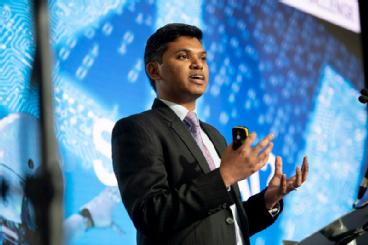 advise on a wide range of science and engineering issues, such as enrolment of Autonomous Vehicles.
advise on a wide range of science and engineering issues, such as enrolment of Autonomous Vehicles.
Today, Friday 14th January 2022, the Department for Transport have announced five new members and a new Chair joining their Science Advisory Council, including Dr Siddartha Khastgir from WMG, University of Warwick.
The DfT’s Science Advisory Council provide the DfT with advice and challenge on key areas of science, engineering and technology, supporting the role for the DfT Chief Scientific Adviser Professor Sarah Sharples, by ensuring departmental activity is informed by the best external expertise and evidence, identifying relevant emerging issues and trends and assuring DfT’s use of science and technology.
Dr Siddartha Khastgir is Head of Verification and Validation of Connected and Autonomous Vehicles at WMG, University of Warwick. In 2019 he was awarded a UKRI Future Leader Fellowship focusing on Autonomous Vehicle safety standards. Leveraging his research on Autonomous Vehicles safety, he will focus on taking a cross-domain approach to safety in land, marine and air.
With his new appointment on the council Dr Khastgir will help advise DfT on the technological and societal challenges surrounding introduction of new technologies, and how they can be enrolled in UK safely and efficiently. He comments:
“To be a part of the Department for Transport’s Science Advisory Council is incredibly exciting, I’m looking forward to working with other experts in the field to provide advice to help the DfT to inform future policy, with its foundations in strong research outputs. Not only do we need to create safe systems, we need to communicate with the public to ensure public acceptance.”
Margot James, Executive Chair at WMG, University of Warwick adds “I am delighted to hear that Siddartha has been appointed to the Department for Transport Science Advisory Council, a reflection of his world-leading research into safety for connected and autonomous vehicles. I will be watching with interest to see how the DfT moves this emerging technology forward, and look forward to Siddartha being a key part of this.”
UKRI Future Leaders Fellowships Director Stephen Meader said:
“The world leading research undertaken by Dr Khastgir and his team is vital for the development of safe autonomous vehicles that can cut both congestion and carbon emissions.
“Dr Khasgir’s appointment to the Department for Transport’s Science Advisory Council (SAC) demonstrates both the importance of this work to the future of mobility in the UK and the value the Future Leaders Fellowships scheme brings in enabling his research.”
Other new appointees joining six existing members include:
· Dr Siddartha Khastgir, Head of Verification and Validation of Connected and Autonomous Vehicles, University of Warwick
· (SAC Chair) Professor Alastair Lewis, Professor of Atmospheric Chemistry, University of York
· James Gaade, Head of Programme Management, The Faraday Institution
· Professor William Powrie, Professor of Geotechnical Engineering, University of Southampton
· Dr Emma Taylor, Head of Digital Safety, RazorSecure Ltd.
· Professor Patricia Thornley, Director of the Energy & Bioproducts Research Institute, Aston University
Department for Transport Chief Scientific Adviser, Sarah Sharples, said: “I’m pleased to welcome the new members appointed to the Science Advisory Council. They bring significant additional expertise in key areas that will support DfT’s effective use of science and engineering. I look forward to working with them.”
ENDS
14TH JANUARY 2022
NOTES TO EDITORS
High-res images available at: https://warwick.ac.uk/services/communications/medialibrary/images/april2020/sid_39.jpg
Caption: Dr Siddartha Khastgir, from WMG, University of Warwick
Credit: WMG, University of Warwick
For further information please contact:
Alice Scott
Media Relations Manager – Science
University of Warwick
Tel: +44 (0) 7920 531 221
E-mail: alice.j.scott@warwick.ac.uk
WMG Professor announced as new Programme Director for Defence and Security at The Alan Turing Institute
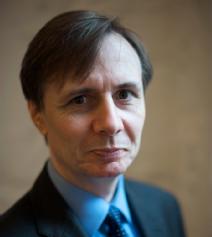 Tim Watson, WMG’s Professor of Cyber Security and the Director of the WMG Cyber Security Centre, has been named as the new Programme Director for Defence and Security at The Alan Turing Institute.
Tim Watson, WMG’s Professor of Cyber Security and the Director of the WMG Cyber Security Centre, has been named as the new Programme Director for Defence and Security at The Alan Turing Institute.
Professor Watson will lead a portfolio of work applying data science and artificial intelligence to national security, cyber security, and defence challenges, working closely with national and international partners.
He will take responsibility for the refresh and delivery of the strategy for the Institute’s Defence and Security Programme. His work will be vital in the development of a vibrant and high impact research and training programme.
Professor Watson is seconded to the Institute from his role at WMG where he has more than thirty years’ experience working with government, industry and in academia, and is an advisor to various parts of the UK Government and to several professional and standards bodies.
Professor Watson said, “I am delighted and honoured to be joining The Alan Turing Institute as its new Programme Director for Defence and Security. The role of data science and AI is more central than ever to our collective safety and security.
“It is vital that the world-class talents brought together by the Turing deliver the tools, insights and advances we need for a safer, more prosperous world. Together with the rest of the team at the Turing and with the wider research community, I look forward to contributing to this important and exciting work.”
WMG appoints new Honorary Associate Professor
 Dr Ahmad Mohsseni, Chief Technology Officer at UKBIC, has been made an Honorary Associate Professor at WMG.
Dr Ahmad Mohsseni, Chief Technology Officer at UKBIC, has been made an Honorary Associate Professor at WMG.
Dr Ahmad Mohsseni joined UKBIC in April 2019, where he sits on the executive committee - the team responsible for delivering and operating the Centre. Dr Mohsseni is responsible for Engineering and Quality specifically.
Prior to this Dr Mohsseni was team leader, project manager and research associate at RWTH Aachen University, and a management consultant at McKinsey and Company. He holds Bachelor and two Master of Science degrees from RWTH Aachen University in Economics, Manufacturing Engineering, and Mechanical Engineering, as well as a PhD in engineering.
Professor David Greenwood, Director for industrial Engagement at WMG comments: “I am delighted for us to deepen the research relationship between UKBIC and WMG through the appointment of Dr Ahmad Mohsseni as Honorary Associate Professor. Ahmad, as CTO of UKBIC has worked closely with the research team at WMG in the fields of battery electrochemistry and battery manufacturing, and his scientific and technical knowledge will contribute greatly to our joint research agenda in the future.”
Jeff Pratt, UKBIC’s Managing Director, said: “I’m delighted with Ahmad’s appointment as Honorary Associate Professor at WMG, at the University of Warwick. This appointment, alongside his role as Chief Technology Officer at UKBIC, recognises Ahmad’s valuable contribution to the development of UKBIC, a facility created to support UK industry with development of battery technologies for future electrification. He will be a great asset to the University.”
In his role as Honorary Associate Professor, Dr Mohsseni will share his expertise by giving seminars and contributing to joint research with WMG staff.
WMG research highlighted in key industry report
Project data analysis research from WMG’s Project Praxis Group was featured in the CBI’s education and skills annual report.
The report entitled ‘Programmes with purpose,’ is an outcomes-led approach to government’s major projects from the perspective of the projects themselves. It is based on delivering sustainable, efficient, innovative, and outcomes-orientated programmes, that put people, communities, value-for-money, and our climate at the foundations of everything done by the various parties involved in major projects.
 WMG’s Professor of Complex Programme Management, Naomi Brookes, explains: “The use of past and current project data to enable effective decisions on project delivery - has the potential to deliver up to £23bn in annual savings across UK infrastructure projects.”
WMG’s Professor of Complex Programme Management, Naomi Brookes, explains: “The use of past and current project data to enable effective decisions on project delivery - has the potential to deliver up to £23bn in annual savings across UK infrastructure projects.”
Read ‘Programmes with purpose’ in full here: 12703_major-projects_programme-perfection-report_ie.pdf (cbi.org.uk)
You can find out more about WMG’s Project Praxis Group here: Project Praxis (warwick.ac.uk)
